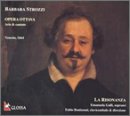| All Artists: Barbara Strozzi, La Risonanza, Fabio Bonizzoni Title: Barbara Strozzi: Opera Ottava, Arie & Cantate Members Wishing: 1 Total Copies: 0 Label: Glossa Release Date: 10/30/2001 Album Type: Import Genres: Pop, Classical Styles: Vocal Pop, Opera & Classical Vocal, Historical Periods, Baroque (c.1600-1750), Early Music Number of Discs: 1 SwapaCD Credits: 1 UPCs: 675754447724, 8424562215030 |
Search - Barbara Strozzi, La Risonanza, Fabio Bonizzoni :: Barbara Strozzi: Opera Ottava, Arie & Cantate
 | Barbara Strozzi, La Risonanza, Fabio Bonizzoni Barbara Strozzi: Opera Ottava, Arie & Cantate Genres: Pop, Classical
|
Larger Image |
CD Details |
CD ReviewsNext to Queen Christina... Giordano Bruno | Wherever I am, I am. | 10/29/2008 (5 out of 5 stars) "... Barbara Strozzi (1619-1677) was surely the woman of the 17th Century with whom I'd have liked to spend an evening. Everything one learns about her suggests that she was a woman "ahead of her times", not only in music but also in intellectual participation in the public life of Venice and Padua. There were other women composers, but by and large they were cloistered nuns like Cozzolani and Vizzana. Strozzi made her living by singing and writing music, although for part of her life she may have been supported by the Vidman father of three of her children. She herself was officially an adopted child, but her adoptive father, the poet Giulio Strozzi, was very likely her natural father by a mistress. Strozzi herself has been labeled by history as a 'libertine', perhaps a professional courtesan, but the scanty evidence doesn't support that dismissive accusation.
Strozzi's madrigals were often settings of her father's or her own poetry. They are impassioned and largely expressive of a woman's point of view. That in itself is not proof that a man didn't write them; Italian poets often wrote in a woman's voice. Whoever the authors, Strozzi's madrigals stretch the boundaries of the dramatic expression of a woman's joys and sorrows over love. The eight madrigal/arias on this CD are exceptionally long for works of this sort at that time in musical history; the longest is 13.5 minutes and the shortest is 4.5. Thus they are 'developed' thematically well beyond the scope of ordinary art madrigals. Their urgent sincerity is a good part of their impact on a modern listener. The demands they make on the singer are also beyond the usual. The recitativo portions require extreme skill and vocal agility in ornamentation, and the aria portions demand a range of two and a half octaves. Soprano Emanuella Galli fills the role of Strozzi very convincingly, both as a singer and as an actress. Her control of dynamics, vocal color, and intonation, and her fluid improvisation of the whole repertoire of trills and figures of baroque music make this performance a perfect model of 'historically informed' singing. Vocal artists of other repertoires - from Indian classical to American jazz - might learn a great deal about the possibilities of the female voice, when properly trained, by listening to Ms. Galli. These madrigals are almost too intense to listen to them all at one sitting; I would urge a listener to take them one at a time. All the pieces of Strozzi's Ottavo Libro are for solo voice, sometimes with violin obbligato, and basso continuo. The continuo on this CD is highly varied, from simple harpsichord to ensembles including cello, theorbo, and baroque guitar. Fabio Bonizzoni, the harpsichordist, is also the director of La Risonanza, an ensemble whose recordings of early cantatas by GF Handel have impressed many listeners as among the finest on the market." |

 Track Listings (8) - Disc #1
Track Listings (8) - Disc #1